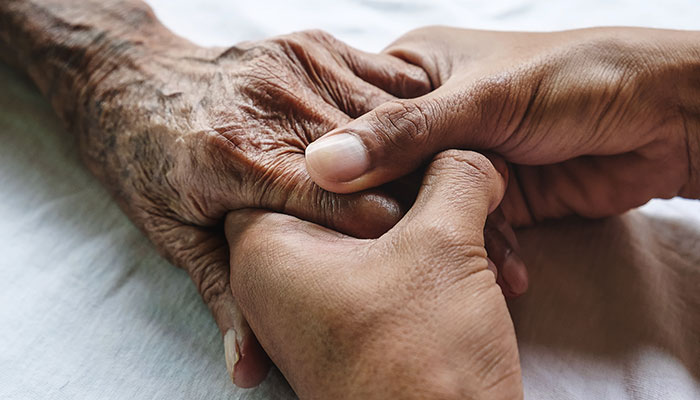Aging Well Syracuse
Helpful tips for family caregivers
January/February 2022
Is family caregiving taking up all your time? No room for socializing? You are not alone! Check out the strategies other family caregivers have used to maintain a healthy balance, including a healthy social life. In our middle article we begin a series about finding a new doctor and reviewing a combination of credible websites that can help you narrow your search. Last, we look at suggestions to help you and your family ease the journey if you have a loved one who is actively dying (in their last two weeks or so). Sad times, but they can also be very sweet in their own way.
Friends? Who has time?
 If you are like most family caregivers, your social life has dropped in priority as you juggle your loved one’s needs. There just aren’t enough hours in the day to keep up all your friendships in addition to your family responsibilities.
If you are like most family caregivers, your social life has dropped in priority as you juggle your loved one’s needs. There just aren’t enough hours in the day to keep up all your friendships in addition to your family responsibilities.
It may also be that friendships are now harder to keep. Many people don’t understand the pressures of caregiving. They may tire of hearing about your challenges and drift away. Or you may feel awkward talking about your concerns, rendering relationships less fulfilling. That’s its own kind of loneliness.
Even if you live with the person you care for, you may feel isolated. In fact, a prepandemic report noted that 29% of family caregivers who live with their relative feel lonely, as compared to 16% of those who live separately. The social restrictions of COVID have made that isolation even more pronounced.
What you can do
- Schedule regular social time on your calendar. Treat it like a prescription and guard that time fiercely. Loneliness has been shown to elevate blood pressure, interrupt sleep, and intensify depression. Its health impact has been equated to smoking 15 cigarettes a day. Spending time with others is not just fluff. It’s a health priority. Even if you have to pay a caregiver so you get time off, consider it an investment in your health.
- Keep it short and convenient. Ideally, talk with at least one other person every day (besides your loved one). It doesn’t have to take up a lot of time. Maybe you text a bit with a buddy. Or have a short phone call with someone who is good for some laughs. The goal is time that provides an alternative focus and genuine relief from the constant responsibilities of caring for another.
- Seek quality companions. Not all contacts have to be with trusted confidants. But you do need a roster of one to three people you can call on when the going gets rough. Maybe aim to find some new friends who are family caregivers themselves (voilà, instant relatability!). Consider joining a support group. Online groups are available and many communities have in-person groups as well.
- Maintain an identity beyond “family caregiver.” This is important not only for your mental health now, but because “caregiver” is not a permanent position. There will be a time when you are no longer providing care. If you have given all of yourself to this task, you will be even more lost when it comes to a close. Keep up with a personal interest. And if there’s a group you can join, all the better. That gives you an excuse to get out for some “me time” and a thread of continuity to carry you into the future.
Need a new doctor?
 The pandemic has brought on a wave of physician retirements. Perhaps one of your relative’s doctors has sent a letter announcing the close of their practice. Yikes!
The pandemic has brought on a wave of physician retirements. Perhaps one of your relative’s doctors has sent a letter announcing the close of their practice. Yikes!
When choosing a new physician, it’s worth the time to do some research. The right fit is critical to your loved one’s health and well-being.
Begin by asking your loved one’s friends for their recommendations. Also ask your relative’s current doctors for input. If your relative has original Medicare, start your search at Medicare.gov. You can filter by zip code. Also, for specialty, gender, and hospital affiliation. What are your relative’s preferences? Make a list of names.
- Address limitations of insurance coverage. If your loved one has Medicare Advantage, they can select only from the doctors within their plan’s network. In that case, start your search on the plan’s website rather than on Medicare’s.
- Google the doctor. As you narrow the list, look up the contenders on Google. See what their website says about them. Their education. Their certifications. Sometimes even their philosophy of medicine or their personal hobbies. Does your loved one resonate with what’s described? Call the office to confirm the doctor is taking new patients.
- Consult watchdog sites. Next, go to the Federation of State Medical Boards. It will reveal if there have been any disciplinary actions. Open Payments provides additional transparency. It lists research money, speaking fees, or other benefits a doctor is receiving from drug and medical device companies. In 2019, 60% of physicians reported some financial relationship with other entities.
- Check online review sites. Insights can be found on sites such as Yelp, Vitals, and Healthgrades. Or even Google Reviews. A balanced evaluation is not guaranteed. However, if a doctor gets consistently negative ratings across multiple sites, likely there’s an issue.
When your relative is actively dying
 In the last two weeks, as a loved one is nearing death, it is natural to want to be at their side. But then, what? Especially if you have never been in this situation before, you may feel uncertain—even awkward—about what to do. The ideal is to be a calm, reassuring, and loving presence focused on keeping your relative comfortable. Here are some tips.
In the last two weeks, as a loved one is nearing death, it is natural to want to be at their side. But then, what? Especially if you have never been in this situation before, you may feel uncertain—even awkward—about what to do. The ideal is to be a calm, reassuring, and loving presence focused on keeping your relative comfortable. Here are some tips.
Physical comfort
- Offer ice chips or a wet washcloth to suck on to ease a dry mouth.
- Put lip balm or olive oil on dry lips to avoid chapping.
- Keep bed linens clean and dry.
- Position them on their side, with head elevated to ease breathing.
- Change their position ideally every two hours to reduce the chance of bedsores.
- Keep blankets on hand for bouts of chill and a cool, damp cloth for flashes of heat.
- Have a commode or bedpan nearby in case they need to go to the bathroom.
- Provide food or drink only if they ask for it.
- Give pain medicines as needed to remain pain free.
Emotional comfort
- Hold their hand—they can still feel.
- Tell them they are loved—they can still hear.
- Thank them for their role in your life.
- Gently offer or request forgiveness, as appropriate.
- Let them know they can let go, that you will be sad, but you will also be alright.
Spiritual comfort
- Engage in rituals of your loved one’s faith.
- Quietly sing songs or pray, as they would wish.
During the last few days, families tend to gather around the bedside as a group. It may be harder for your relative to let go when surrounded by loved ones. Consider instead taking turns so that one of you is present at all times. This allows each person their private goodbyes. Also a way your relative can be monitored for comfort while providing the stillness that’s needed to pass on.
Return to top
